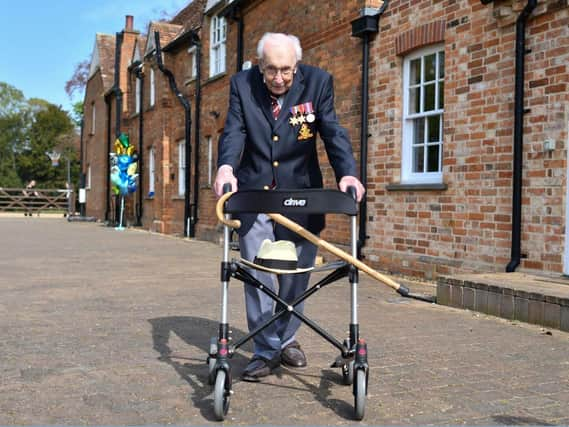We just need to hold on to hope to see us through coronavirus crisis


By the time this column is published, we’ll be a week into the extended lockdown.
Today’s press brings a certain relief that the new numbers of those who have died after testing positive for Covid-19 are under 900, in a small illustration that we quickly acclimatise to unthinkable things when they are immovably real.
Advertisement
Hide AdAdvertisement
Hide AdOn average, something like 1,600 people die in Britain every day, making some 600,000 deaths annually.
Such statistics do not reassure us that we are within normal, and neither should they, for plenty of those who have left us would not have died any time soon.
I very much hope that better figures greet us soon and that solid, life-saving evidence begins to emerge that we’re doing the right thing, but it is simply necessary to have faith that staying at home and distancing ourselves from others will protect the NHS and preserve life.
All those messages in the recent past about ‘it might save lives’ have lost their vagueness – we know it will, we just need to hold on to hope.
That is, of course, easier said than done.
Advertisement
Hide AdAdvertisement
Hide AdIt starts with a virus that you can’t see, and if you do it’s not a red flag but someone right in front of you.
You can’t tell where it might come from, or whom you might give it to. You can’t say whether one person will get it mild, or another severe.
Large numbers of people, who didn’t otherwise seem especially vulnerable, have found themselves in severe difficulties or even losing their lives.
And we don’t know what impact the state of our society has had on the trajectory of this terrible virus.
Advertisement
Hide AdAdvertisement
Hide AdAs time goes on, we’ll know more, as time passes new treatments, vaccines, and ways of living our lives to combat this will emerge.
But for now the message is as writ large as it ever has been: Stay Home, Protect the NHS, Save Lives.
Churches have been undergoing significant changes, along with many other parts of our society, dividing the tasks that are essential (and so must continue as normally as possible), and those parts that can continue only in a radically different way.
It’s a testament to the fact that while our church buildings are houses of prayer and temples of God, prayer and worship do not rely upon them, but are enlarged by them.
Advertisement
Hide AdAdvertisement
Hide AdAnd while the pastoral and social work of Christians continues unhindered, we’ll rightly need – when this crisis has ended, and it will – to reconsider our attitude toward the things that closed, or stopped, or changed while we were trying to protect our society.
Over the last couple of weeks, people have been sharing Facebook messages designed to show up in their memories in years to come.
Reminders about fuel prices, support for the unemployed, untold resources for the NHS, applause on our streets, nonagenarians raising millions for the health service, and all manner of other positive things amid the terror and tragedy.
For the sake of recovering well, and of learning from what we’re living through, let’s remember well what is happening now by recording it.
Advertisement
Hide AdAdvertisement
Hide AdThe numbers matter most because they’re someone’s child, someone’s parent, a real person nestling amid a huge cost to our nation.
But the numbers aren’t the whole story, and that belongs to those who will be fortunate to live through this, and live beyond it.